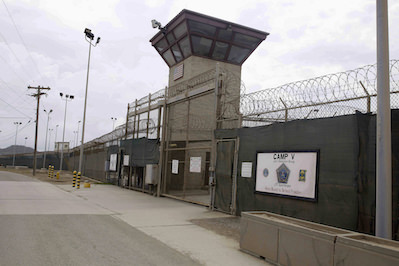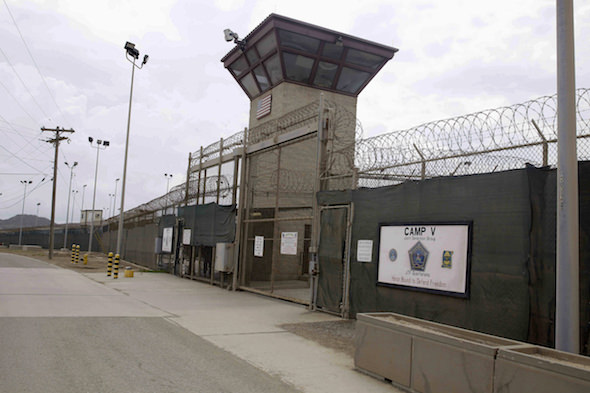Truthdigger of the Week: Pardiss Kebriaei, a Lawyer Shedding Light on ‘Gitmo’ Prison and Prisoners
In her writings she brings to life the cruelties that the inmates have endured, and in her legal work she has succeeded in getting several men cleared and released.

The entrance to Camp 5 and Camp 6 at the U.S. military’s Guantanamo Bay detention center. (Ben Fox / AP)
Every week the Truthdig editorial staff selects a Truthdigger of the Week, a group or person worthy of recognition for speaking truth to power, breaking the story or blowing the whistle. It is not a lifetime achievement award. Rather, we’re looking for newsmakers whose actions in a given week are worth celebrating.
When a United States detention center is hundreds of miles off the coast, it can be difficult for Americans to imagine the plight of the people who have been held there for the past 15 years. The harrowing accounts that we have all heard about torture and abuse at Guantanamo Bay, Cuba, blur together, creating an unshakeable malaise, partly because we hear more often about the methods of torture than about the suffering of the human beings who experience the terror tactics.
Perhaps this is why the articles of Pardiss Kebriaei, a senior staff attorney at the Center for Constitutional Rights, can unexpectedly move us to tears. In a 2015 Harper’s Magazine article, Kebriaei told the story of Muhammed and Abdul Nasser Khantumani, a young Syrian man and his father, who were both detained at Gitmo for years without a reasonable explanation and who were separated when authorities realized that they provided comfort to one another.
The two men, who have now been relocated, are still separated. Muhammed has gone to Portugal, and Abdul Nasser to Cape Verde, approximately 3,000 miles away. Abdul Nasser can see his family only through Skype and photographs, but his hardship is still a far cry from the isolation and torture of eight years at Guantanamo. Below is an excerpt from Kebriaei’s simultaneously heartbreaking and heartwarming piece about the father and son:
Muhammed thinks that he started to crack sometime in 2005. That was the year he and his father were moved into separate camps. Interrogators learned early on that proximity to Abdul Nasser was a “comfort item” they could manipulate to try to make Muhammed talk. After Muhammed became uncooperative, they relocated him as a form of punishment. It would be years before they would hear each other’s voices again.
Muhammed started smearing excrement on his cell walls. He kicked a guard, and bit another. In late 2006, his “noncompliant” behavior got him sent to the base’s newly constructed supermax prison — Camp 6 — where he would later cut his wrists. In Camp 6, Muhammed was held in a windowless concrete-and-steel cell for at least twenty-two hours a day. He stayed in solitary confinement almost continuously for the next three years.
After Muhammed cut his wrists, I spoke with him on the phone. “Please do something,” he screamed. “I can’t be patient anymore.” I filed an emergency request asking for him to be moved from solitary confinement to his father’s camp. It was denied. Prison officials said that Muhammed had narcissistic traits and had cut himself to get attention. A few years earlier, an official at the State Department had called three alleged suicides at Guantánamo “a good PR move.”
In 2013, Kebriaei reported the specifics of a hunger strike that Guantanamo Bay detainees had held after their Qurans were searched, and in their eyes, desecrated.
I met with men who are weak and have lost between 30 and 40 pounds. They told me of other men who are skeletal and barely moving, who have coughed up blood, passed out, and one who tried to hang himself.
One of the men I met with, Sabry Mohammed, a Yemeni who remains detained years after he was approved for release by the Obama administration, said, “We are dying a slow death here.” Yet the authorities say they will not let men die — they will force-feed them when their body weight drops dangerously low, strapping them into chairs and forcing a tube up their noses that pumps formula into their stomachs. The military reports that so far, 11 men are being “saved” this way. Yet as one of the men put it, the irony is that “the government will keep us alive by force-feeding us but they will let us die by detaining us forever.”
Kebriaei relates these stories with compassion and moving eloquence, just as she does the horror story of Fahad Hashmi, a U.S. citizen who has been held under dubious charges at the Administrative Maximum Facility (ADX) in Colorado for allegedly providing material support to al-Qaida, a federal prison akin to Gitmo on American soil. Hashmi says he has been decaying there in a small, concrete cell, a torture that Kebriaei described in The Nation as “silently mind-crushing.”
For over 2,100 days, he has been alone in a space he can touch both sides of simultaneously. He has not touched another human being since 2007. While he has been at ADX for nearly three years, he has no sense of his surroundings, because all he can see of the natural world is a patch of sky through steel mesh from an outdoor “recreation” cage two to three times a week, if that. He has not set foot on anything other than concrete in over six years. The image of Fahad’s torture is not that of a person being led around an interrogation room on a dog leash, or held in a stress position with heavy-metal music blasting. It is a person sitting still in a small cell, slowly deteriorating in a modern prison on the outskirts of a small Colorado town.
Word by word, Kebriaei brings to life the cruelties these prisoners have endured and the injustices that have marked them, and she humanizes the men with details of their lives, before, during and after their detention. She reminds us that they are people with mothers and sisters and brothers and wives and children, people whom our government has condemned to an inhumane existence filled with unending physical and psychological pain, pain inflicted in the name of the United States, in the name of its citizens under the guise of a “war on terror,” waged in the aftermath of the September 11 attacks with the bloody tragedy as its justification. Kebriaei, who has fought on behalf of detainees such as Sabry Mohammed, Muhammed and Abdul Nasser Khantumani, Fahad Hashmi and several others, and has written for numerous publications as well as spoken to DemocracyNow! and RT News about government abuses, was in the news again this week for her role in the clearing of another detainee whose case was reviewed recently by the Periodic Review Board.
“These people have not been reviewed in over six years. They have changed, circumstances have changed, and they have needed a fresh look,” Kebriaei said, according to an Associated Press story published after the initial decision. In a subsequent Truthdig post, assistant editor Alexander Reed Kelly wrote:
Those who oppose closing the U.S. detention center at Guantanamo Bay often suggest that the prisoners held there are too dangerous to be released, either because of who they were before they were placed there or who they became during their detention.
Well, a review board that includes military and intelligence officials has been looking at a list of 50 prisoners who were previously deemed “too dangerous to transfer but not feasible for prosecution,” and finding many of them fit for release.
For her laudable efforts to shed light on the injustices that the U.S. government has carried out on our fellow human beings in numerous ways for the past 15 years and her effective representation of detainees — several of whom have been cleared and released — as well as her continued advocacy on their behalf, Kebriaei is our Truthdigger of the Week.
Independent journalism is under threat and overshadowed by heavily funded mainstream media.
You can help level the playing field. Become a member.
Your tax-deductible contribution keeps us digging beneath the headlines to give you thought-provoking, investigative reporting and analysis that unearths what's really happening- without compromise.
Give today to support our courageous, independent journalists.






You need to be a supporter to comment.
There are currently no responses to this article.
Be the first to respond.